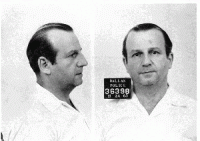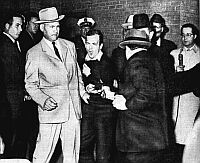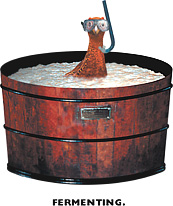

| The CRYPT Mag |

Jack Ruby was born in 1911. His real name being Jacob Rubenstein. His parents were Polish immigrants, and he grew up in Chicago. As a boy, he ran errands for Al Capone.
In 1937-39, Jack Ruby was a "union organizer" and "secretary" for a local branch of the Scrap Iron and Junk Handlers Union in Chicago.
During World War II, Jack Ruby served in the U.S. Air Force. After a business venture with his brothers fell through, he left Chicago and moved to Dallas, where he opened up his first nightclub that he named the Silver Spur.
In 1957-58, he was running guns to the followers of Fidel Castro, who were fighting to overthrow Batista. In 1959, Jack Ruby went to Havana to try to gain the release of Santos Trafficante, who had been jailed by Castro's government for his role in Mafia gambling and narcotics activities. Trafficante later participated in a CIA plot to kill Castro.
During the early 1960s, Jack Ruby helped supply arms to the anti-Castro Cubans. During the 1950s-1963, he ran several nightclubs. At the time of President Kennedy's assassination, he lived in the Oak Cliff section of Dallas.
On Nov. 24, 1963, Jack Ruby fatally shot JFK assassination suspect Lee Harvey Oswald in the basement of a Dallas police station, where he was being transferred to the County Jail.

Ruby had walked down a car ramp to get to the basement, even though the entrance to the car ramp was guarded by a police officer.
In 1964, Jack Ruby was brought to trial for the murder of Lee Harvey Oswald. In that same year, he was convicted and sentenced to death.
In 1966, the judgment of death was reversed by the Texas Court of Criminal Appeals, and he was granted a second trial. On January 3, 1967, Jack Ruby died from lung cancer before his second trial could begin.
Many take it for granted that if there was an assassination conspiracy, Jack Ruby must have been involved. In fact, many people believe there was a conspiracy precisely because of Ruby's murder of Lee Harvey Oswald, which had the effect -- intentional or not -- of silencing the accused assassin.
But whether there was a conspiracy or not, there is no reason to assume that Ruby must have been involved. In fact, logic tells us that no conspiracy could profit by silencing Oswald in a public fashion: What's the point of eliminating one suspect while simultaneously handing the police another? Also, were it Oswald's intention to "talk," he'd already had nearly 48 hours in which to do so. Every minute he waited only diminished the chance that others involved could be apprehended. By that time, any conspirators would have to assume he'd already spilled his guts.
Another factor to be considered is whether Ruby was the type of person to be entrusted with any responsibility, when a single word from him could have resulted in the arrest of others involved. Dallas reporter Tony Zoppi knew Ruby well and says one "would have to be crazy" to entrust Ruby with anything important, that he "couldn't keep a secret for five minutes. . . . Jack was one of the most talkative guys you would ever meet. He'd be the worst fellow in the world to be part of a conspiracy, because he just plain talked too much." "Jack Ruby would be the last one that I could ever trust to do anything," says Ruby's rabbi, Hillel Silverman.
Rabbi Silverman says, "He was a very volatile, a very emotional, unbalanced person. He thought he was doing the right thing when he shot Oswald. He loved Kennedy." "I hope I killed the son of a bitch," Ruby said immediately afterwards to the Dallas police who arrested him. "It will save you guys a lot of trouble." He told Assistant DA Bill Alexander, "Well, you guys couldn't do it. Someone had to do it. That son of a bitch killed my President."
"Jack actually thought he might come out of this as a hero of sorts," says Alexander. "He thought he had erased any stigma the city had by knocking off Oswald." Attorney Jim Martin spoke to Ruby soon after his arrest and says, "He never expected to spend a night in jail."
In fact, when the crowd outside Dallas Police Department headquarters heard that Oswald had been shot, they burst into applause.
What about the question of motive? Did Ruby really shoot Oswald because he wanted to spare Mrs. Kennedy the ordeal of Oswald's trial? Or did he have a more obvious motive? "Everybody has fantasies about wanting to be a hero," says James R. Leavelle, the homicide detective in the white hat who was handcuffed to Oswald when Ruby emerged from the shadows. "Ruby told me an interesting thing when I was a patrolman," Leavelle recalls, "which didn't make any sense to me at the time, but it did after Ruby shot Oswald. He told me, 'I'd like to see two police officers sometime in a death struggle about to lose their lives, and I could jump in there and save them and be a hero.'"
Leavelle accompanied Ruby when he was transferred from the city jail. He says, "When I transferred him, I told him when we were going down on the elevator, 'Jack, in all the years I've known you, you've never done anything to hurt a police officer, but you didn't do us any favors this time.'" Ruby replied, "Well, all I wanted to do was be a hero, and it looks like I just fouled things up."
Sgt. Gerald Hill had known Ruby for over a decade at the time of the assassination. Hill says, "I think his calculating mind was going all the time on the assumption that 'I'll shoot Oswald. Public sentiment will get me off, and then I'll make a million bucks because everybody'll come to see the man that killed the man that killed the President!'"
| © RIYAN Productions |
